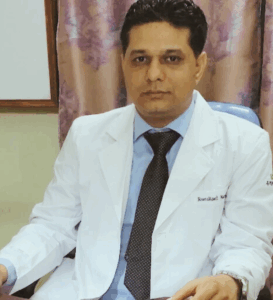Unicondylar knee replacement, a surgical procedure designed to address specific cases of knee joint degeneration, can be a game-changer for many individuals suffering from knee pain and limited mobility.
However, it is crucial to recognize that this procedure is not suitable for everyone. Choosing the right surgeon is equally important in making an informed decision about your knee health.
Meet Dr. Ramakant Kumar, Unicondylar Knee Surgery Specialist an accomplished orthopedic specialist renowned for his expertise in knee surgeries.
In this article, we will discuss the individuals who should exercise caution and consider alternatives to unicondylar knee replacement while highlighting the invaluable guidance of Dr. Kumar in making the right choice for your knee health.
Contents
Who Should Not Go For Unicondylar Knee Replacement?
While it can be an effective treatment for the right candidates, it may not be suitable for everyone. So Who Is a Candidate for Partial Knee Replacement?
Here are some factors that may indicate that a person should not undergo unicondylar knee replacement:
#1. Extensive Knee Arthritis:
Unicondylar knee replacement is typically performed when arthritis is limited to one compartment of the knee (usually the medial or lateral compartment).
If a person has extensive arthritis affecting multiple compartments of the knee, a total knee replacement may be more appropriate.
#2. Inflammatory Arthritis:
Unicondylar knee replacement is generally not recommended for individuals with inflammatory forms of arthritis, such as rheumatoid arthritis. These conditions often involve widespread joint inflammation that can affect multiple knee compartments.
#3. Ligament Instability:
Patients with significant ligament instability in their knee joint may not be good candidates and they may face Disadvantages Of Partial Knee Replacement. The procedure relies on the integrity of the knee’s ligaments to provide stability.
#4. Severe Bone Defects:
If there are severe bone defects in the knee joint due to trauma or other conditions, it may become a case of Partial Knee Replacement Failure Symptoms. In such cases, a total knee replacement may be necessary to address the bone loss.
#5. Obesity:
It can increase the risk of complications following knee surgery. Surgeons may consider other treatment options or encourage weight loss before performing unicondylar knee replacement in individuals with obesity.
#6. Younger Age:
What Is the Life Expectancy of a Partial Knee Replacement?
Younger patients may not be ideal candidates for unicondylar knee replacement because the artificial joint may wear out over time, and they may require a revision surgery.
In such cases, conservative treatments or alternative surgical options may be considered.
#7. Medical Conditions:
Certain medical conditions, such as uncontrolled diabetes, heart disease, or infections, can increase the surgical risks associated with knee replacement procedures.
Surgeons may recommend addressing these conditions before considering surgery.
#8. Unrealistic Expectations:
Patients with unrealistic expectations about the outcomes of unicondylar knee replacement may not be good candidates.
It’s essential for individuals to have a clear understanding of the procedure’s limitations and potential benefits.
Ultimately, the decision to undergo Unicompartmental Knee Replacement Recovery Time should be made after a thorough evaluation by a healthcare professional, typically an orthopedic surgeon.
The surgeon will consider the patient’s specific condition, overall health, and individual needs to determine the most appropriate treatment plan, which may include Pros And Cons of Partial Knee Replacement or another surgical option.
Is Partial Knee Replacement Surgery Worth It?
Success Rate of Partial Knee Replacement can offer significant benefits for many individuals suffering from isolated knee joint issues, it may not be suitable for everyone.
Patients with severe osteoarthritis affecting multiple compartments of the knee or those with complex deformities should carefully consider alternative treatment options.
To make an informed decision about your knee health, it’s essential to consult with a qualified Knee Replacement Surgeon in Patna Dr. Ramakant Kumar.
He possesses a wealth of experience and expertise in evaluating individual cases. Dr. Kumar can provide personalized guidance, ensuring that you receive the most appropriate and effective treatment tailored to your unique needs and circumstances.
Your knee health is paramount, and consulting with a specialist like Dr. Kumar can help you achieve the best possible outcome.



